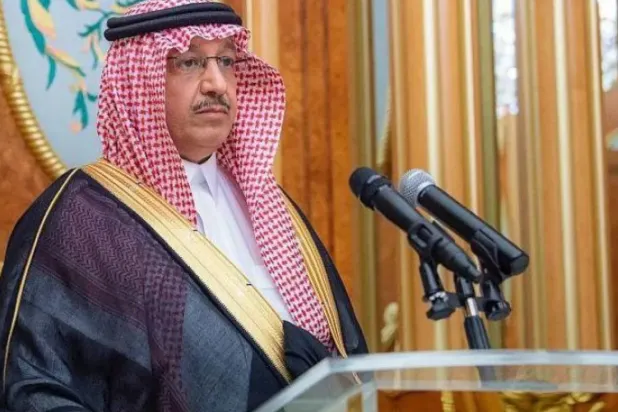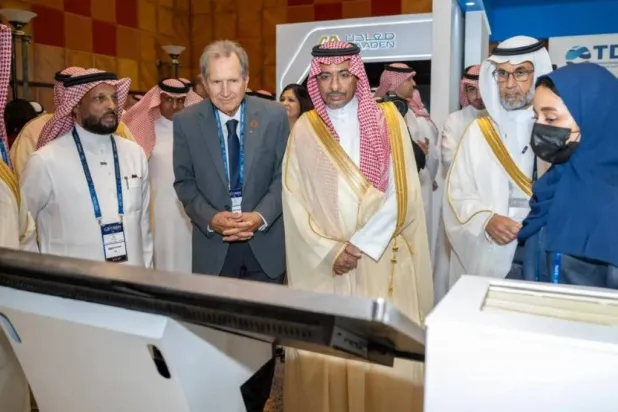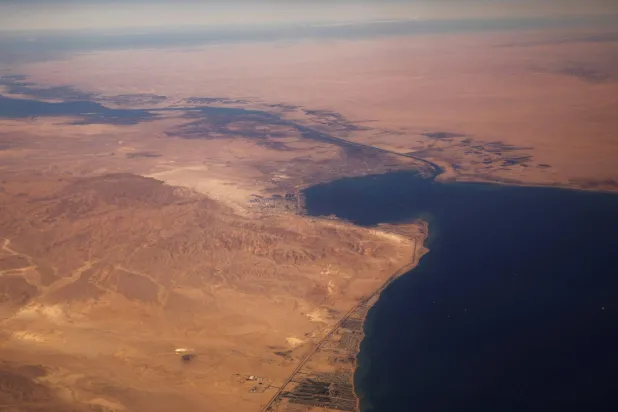Saudi Arabia is moving swiftly to cement its position as a global manufacturing and production hub, capitalizing on its sweeping economic transformation.
The “New Economic Corridor” stands out as a pivotal initiative supporting this drive, built on four integrated national strategies: localization, industry, mining, and exports.
Together, these strategies aim to turn the Kingdom into a regional and global platform for production and exports, one that attracts high-value investments and fuels economic transformation under Vision 2030.
Speaking to Asharq Al-Awsat, Minister of Industry and Mineral Resources Bandar Al-Khorayef said Saudi Arabia’s alignment of these four strategies positions it to become both a regional and global manufacturing center.
He noted that the Kingdom’s strong natural and human resources, including abundant oil, gas, petrochemicals, and minerals, complement its strategic geographic location, which grants access to key and emerging markets across the region, Africa, Central Asia, and other parts of Asia.
Boosting Petrochemical Conversion
Al-Khorayef revealed that efforts are underway to channel part of Saudi Arabia’s petrochemical exports into local downstream industries.
A successful pilot project carried out in cooperation with the Ministry of Energy led to a domestic demand surge of more than 300,000 tons for one product, with more items expected to be added in the future. This initiative, he said, will bolster downstream industries and strengthen their contribution to the national economy.
Expanding Pharmaceutical and High-Tech Manufacturing
On pharmaceuticals, the minister pointed to a clear plan that has significantly increased the number of local factories. The Kingdom, he said, has succeeded in localizing the production of sensitive medical products such as insulin and is currently advancing projects in vaccines and biologics.
Al-Khorayef also highlighted Saudi Arabia’s growing focus on advanced technology industries, including electronics and microchips. He cited partnerships with private-sector firms such as Alat and cooperation with the Ministry of Communications to promote information technology within this advanced industrial push.
Attracting Future Technologies
The minister emphasized the Kingdom’s strong infrastructure, noting that its ports, roads, and railways reflect political and financial stability and enhance competitiveness in the energy sector, a critical component of industrial zones.
“This combination of resources, location, and infrastructure makes Saudi Arabia a key partner and an essential hub in global industries,” he said, adding that the ministry’s focus is on attracting technologies of the future rather than those of the past.
Over the past six years, Al-Khorayef said, the government has introduced a range of effective policies and incentives – most notably the promotion of local content, which has become the biggest driver of investment. It gives investors priority in the domestic market, including in government procurement and major corporate contracts.
He added that the state’s investment in industrial city infrastructure has been a decisive factor, with more than 25 million square meters developed and advanced industrial cities and ready-built factories established.
These conditions, he explained, make investment easier, thanks to industrial financing from the Saudi Industrial Development Fund, export financing from the Saudi EXIM Bank, and incentives under the “Made in Saudi” program led by the Saudi Export Development Authority.
These policies, he said, are stable and long-term, while temporary incentives are available for energy projects and standardized incentives for localization, subject to the approval of a ministerial committee, measures that enhance the Kingdom’s ability to attract quality investments.
Expanding Global Partnerships
Al-Khorayef said his recent tours to several world capitals aim to encourage the Saudi private sector to forge international partnerships and promote the Kingdom as a leading global investment destination.
He noted that Saudi Arabia recently took part in Germany’s K Show 2025, where German companies expressed keen interest in investing in the Kingdom.
The minister also said Saudi Arabia has become a global platform for discussing mining issues among governments and companies, stressing that the sector needs more firms, investment, and scientific research. He said current efforts focus on strengthening the technical and scientific aspects of mining to enhance its efficiency.
Mining, he added, is the third pillar of Saudi industry after oil, gas, and petrochemicals, with mineral wealth estimated at around 2.5 trillion riyals ($667 billion).
He disclosed that efforts are underway to extract lithium from water used in oil and gas operations as well as from desalinated and seawater, expressing optimism about achieving positive results in the near future.
Original Post


